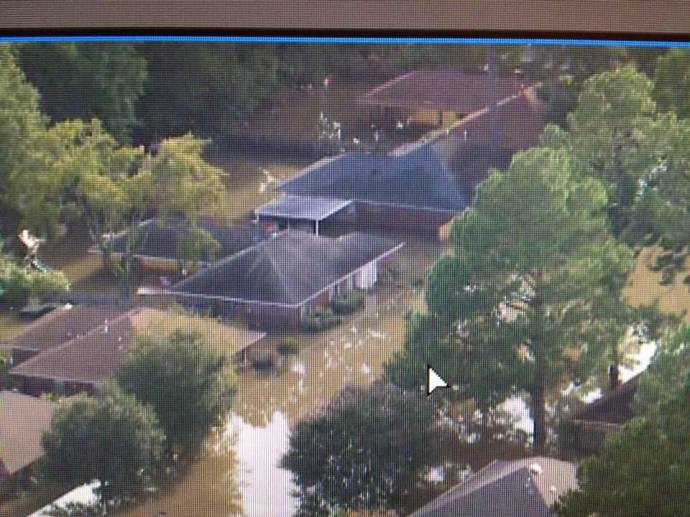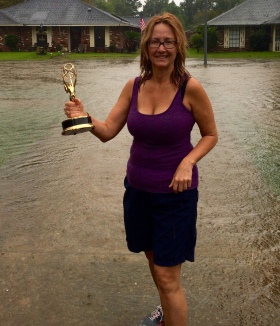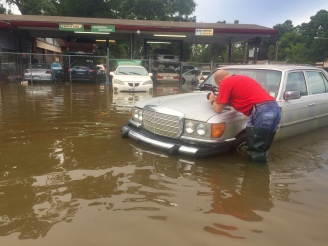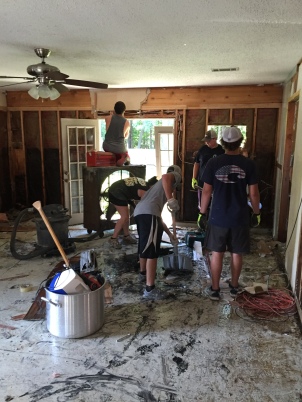 Rain cascaded off of the hood of my slicker suit, past the eye cup of my camera, and dropped into the shin-deep water under my tripod. I barely noticed the reporter blinking behind water-speckled eyeglasses. It was the boat motoring down what, 12 hours earlier, had been a neighborhood street that had my attention.
Rain cascaded off of the hood of my slicker suit, past the eye cup of my camera, and dropped into the shin-deep water under my tripod. I barely noticed the reporter blinking behind water-speckled eyeglasses. It was the boat motoring down what, 12 hours earlier, had been a neighborhood street that had my attention.
An elderly man in a plastic, yellow coat wrapped his arm around a gray-haired woman shivering under an umbrella as they drifted toward me. On the deck, a garbage bag that I assumed held the couple’s only worldly possessions not soon to be underwater. At the aft, a middle-aged man wiped rain from his face as he steered.
I’m actually surprised I remember so much detail; my mind was not on my job. I was thinking about my wife.
I had left her just thirty minuets earlier. I had snugged the blankets around her as I kissed her forehead and left for work. Before leaving, I had checked the neighborhood. The weatherman had said water was on the way. Our neighborhood had survived the great flood of 1983, then the flood of ’91, and Tropical Storm Allison which had put so many others underwater. We would be safe. But how close would the water get?
The Amite River meanders through the dense woods between our neighborhood and the city of Denham Springs, a mile-and-a-half east of our home as the crow flies. At 6:30 that Saturday morning, it was just 80 yards from our back door.

It was 7AM when I got the text. “The water is at the door. Paul and Eileen are helping me leave.” I told my wife I was on my way. She told me, “Why? There is nothing you can do. It’s coming too fast.”
Before she left, she took one picture, “I saved the important stuff.” A joke, something to lift my spirits while pushed down my emotions to focus on my job — getting information to a bewildered, waterlogged, and lost community.
Over the next two days, the Amite’s muddy water seeped past our locked doors and made itself at home. It left its mark at five feet, just above the light switches. I shot images of homes
with water to their roofs, newly homeless wading on flooded high ground with garbage bag luggage, reporters interviewing shell-shocked evacuees. I filed reports solo via cell phone. I sat at the anchor desk chatting with viewers about what I had seen.  About what we had lost.
About what we had lost.
It was an on-air question by my friend, our main anchor Greg Meriweather, that did it. “How can you sit here and be so upbeat and calm when you just saw your house with water almost to the roof, and you realize that, like so many of our viewers, you just lost everything?”
For two days, I had answered anyone who asked, “We are lucky.” It wasn’t a cliche. We were.
My wife, son, and I were safe. Wonderful friends had taken us in and offered us their home for as long as we need it. We got out with two duffle bags of clothes when many had only the clothes on their backs. We were not in a shelter. Our employers had not been flooded. We would not miss a paycheck.
I don’t know where the answer I gave Greg came from that evening, but I talked not about the flood, or our luck, or our community. I talked about my childhood.
About a blue collar neighborhood where people don’t sit around complaining about work that needs to be done. They go out and do it. About faith. Not the kind we practice in church on Sundays, but the example of service lived by the Brothers of the Sacred Heart who ran my high school. I talked about lessons. Not not lessons taught in class, but those absorbed growing up in a small town filled with selfless people, that there is always someone more important than me. And lessons yet to be learned, like accepting God’s grace in the form of helping hands from friends and strangers.
I told Greg that what had humbled us most over those two days had not been the scope of the waters or the power of nature. More humbling for my wife and I were the number of people who launched their boats off the interstate to help. They were not marshaled by the police, or requested by the government. The Cajun Navy showed up on its own.
 Boatmen like the middle-aged man in my lens two days earlier had come to help. They did not ask about race, religion, sexual identity. They just put people in their boats and brought them to safety.
Boatmen like the middle-aged man in my lens two days earlier had come to help. They did not ask about race, religion, sexual identity. They just put people in their boats and brought them to safety.
Most humbling was the number of friends, family, and total strangers who offered prayers for our safety, our future, and our strength.
One week after the flood waters left our home, my wife, son, and I stood drenched in sweat inside the shell of our home. We looked around at the army of friends and family working pulling sheetrock, ripping out cabinets, and hauling debris to the curb. Greg’s question rolled through my head. “How can you be so upbeat and calm, when you’ve just lost everything.”
This time, a different answer came to mind. We may have lost everything we owned. But we have not lost everything.

Outstanding writing Rick. But you don’t need me to tell you that. Thoughts are still with you, your family and community from here in the UK.
Paul M.
Pingback: Return to Everest | Rick Is Not Writing . . . again